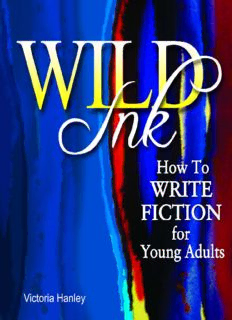
How to Write Fiction for Young Adults PDF
Preview How to Write Fiction for Young Adults
What does it take to break into the flourishing Young Adult (YA) market? What are common mistakes to avoid in writing for teens? With this guide, award-winning author Victoria Hanley helps writers better understand the ins and outs of the young adult genre. With humor and a solid grounding in reality, she offers unique insights and also writing exercises designed to help writers tap into their wild side and find their “inner teen.” Hanley interviews successful authors of YA literature—T.A. Barron, Joan Bauer, Chris Crutcher, David Lubar, Lauren Myracle, and others—who give their best advice on writing for teens. Agents and editors also provide tips about how to successfully submit manuscripts in this competitive market. “I recommend Wild Ink to any adult writers who dream of writing a great young adult novel (perhaps even you!).” Diane Tuccillo, author of Library Teen Advisory Groups: A VOYA Guide “Wild Ink is so fantastic, if you don’t buy it and read it, your nose will fall off!” Clifford Mayes, Professor of Education Psychology, Brigham Young University, and author ofInside Education: Depth Psychology in Teaching and Learning Praise for Victoria Hanley’s fiction: “…complex and engrossing…” —School Library Journal “...sings with excitement.” —Publishers Weekly “Solid and satisfying.” —Kirkus Reviews Victoria Hanley is the author of The Healer’s Keep, The Light of the Oracle, and The Seer and the Sword. Her books have been published in dozens of countries in ten languages. BOOKS VICTORIA HANLEY by The Seer and the Sword The Healer’s Keep The Light of the Oracle Seize the Story Violet Wings H OW TO W F RITE ICTION FOR Y A OUNG DULTS Victoria Hanley Cottonwood Press, Inc. Copyright © 2008 by Victoria Hanley All rights reserved. Published by Cottonwood Press, Inc. No part of this work may be reproduced or transmitted in any form or by any means, electronic or mechanical, including photocopying and recording, or by any information storage and retrieval system, except as may be expressly permitted by the 1976 Copyright Act or in writing by the publisher. www.cottonwoodpress.com Print ISBN 978-1-877673-80-1 Kindle ISBN 978-1-877673-93-1 E-book ISBN 978-1-877673-94-8 Sony Reader ISBN 978-1-877673-95-5 Library of Congress Control Number: 2008921085 Printed in the United States of America Cover art by Pat Howard To you— and your success as a writer T C ABLE ONTENTS of Chapter One: Spirit of Youth . . . . . . . . . . . . . . . . . . . . . . . . . . . . . . . . . . .13 Chapter Two: Finding Your Writing Self . . . . . . . . . . . . . . . . . . . . . . . . . .33 Chapter Three: Obstacles and Demons . . . . . . . . . . . . . . . . . . . . . . . . . . .57 Chapter Four: Resources for Writers . . . . . . . . . . . . . . . . . . . . . . . . . . . . .73 Chapter Five: Submitting Your Manuscript . . . . . . . . . . . . . . . . . . . . . . . .91 Chapter Six: Getting Your Book Published . . . . . . . . . . . . . . . . . . . . . . .123 Chapter Seven: Self-Publishing Your Book . . . . . . . . . . . . . . . . . . . . . . .155 Chapter Eight: Words of Wisdom from Authors . . . . . . . . . . . . . . . . . . .173 I NTRODUCTION Every Thursday at eleven a.m., Maryjo Morgan opens her home for a meeting of the Weekly Writers’ Workshop—a group of people dedicated to improving their writing. Members range in age from late twenties to going on seventy. Each person has a different focus—everything from books for children to lifestyle essays to ad copy for carpet cleaning. Some arrive ahead of the clock, and call hellos as the rest of us come in. Maryjo bustles in her kitchen, stirring a steaming soup kettle, phone wedged between shoulder and ear, finishing business calls as she nods and smiles greetings. When we’re all gathered at her big welcoming table, Maryjo bangs her gavel—a gift from the group. “Accountability,” she says. “Who wants to start?” And the meeting takes off. Members report writing trials and triumphs: beginnings, completions, submis- sions, rejections, payments, contracts, leads—whatever’s going on. Then, before settling down to a critique session, Maryjo announces the weekly “prompt,” a short writing assignment to be done then and there. “This week I’m going to pass out fortune cookie slips,” she says. “Take one and set down your thoughts about the fortune you get and what it means to you.” The following week she might say, “Write about scars you have.” Or, “Include the words red, multifarious, and redemption in a short essay.” And so on. She sets her timer. For six minutes, nothing is heard but scratching pens, gig- gles and sighs. The timer dings. We go around the table and read aloud what we’ve written, eliciting applause, an occasional tear, and sometimes gasping guffaws. Often, the prompts that have been greeted with the most ferocious groans are the ones that yield the best writing. ***** The first time I attended Maryjo’s group, I was ill at ease with the prompt. I was used to working alone within the dream world of the fantasy writer, and it had been years since I’d written any nonfiction. Now I was expected to organize my thoughts in six minutes, write them down and then share them?
